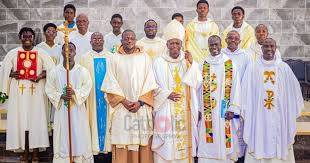Ghana Catholic Church Takes Stand Against Illegal Mining: A Call for Environmental Justice
In recent years, illegal mining activities, popularly known as "Galamsey," have posed a significant threat to Ghana's environmental sustainability and public health. The detrimental effects of these activities are far-reaching, impacting water quality, land degradation, and the livelihoods of communities. In response to this crisis, the Ghana Catholic Church has taken a firm stand against illegal mining, advocating for environmental protection and social justice.
The Galamsey phenomenon, while providing short-term economic benefits to some, has led to extensive environmental degradation. Rivers have been polluted with mercury and other harmful chemicals, soil fertility has diminished, and entire ecosystems have been disrupted. Communities that depend on agriculture and clean water are bearing the brunt of these practices, leading to increased poverty and health issues.
Recognizing the urgent need for action, the Ghana Catholic Church has been vocal in its opposition to illegal mining. In a series of statements and public engagements, church leaders have highlighted the moral imperative to protect God's creation. They argue that the environment is a shared heritage that must be preserved for future generations. The church's position is rooted in a deep commitment to social justice, emphasizing that the most vulnerable populations are often the hardest hit by the consequences of illegal mining.
One of the church's key initiatives is to raise awareness among its congregations about the dangers of Galamsey. Through sermons, workshops, and community outreach, church leaders are educating their followers on the environmental and health risks associated with illegal mining. They encourage communities to advocate for responsible mining practices that prioritize environmental sustainability and respect for human rights.
Additionally, the church is collaborating with various stakeholders, including government agencies, non-governmental organizations, and local communities, to develop comprehensive strategies to combat illegal mining. This collaboration is vital, as it brings together diverse perspectives and expertise to address a multifaceted issue. The church's involvement underscores the importance of community-led efforts in protecting the environment and promoting sustainable development.
Moreover, the Ghana Catholic Church has been advocating for stricter enforcement of mining regulations. They emphasize the need for government accountability and transparency in the licensing and monitoring of mining activities. By pushing for policies that prioritize ecological conservation and community welfare, the church aims to foster a more sustainable mining sector that benefits all Ghanaians, rather than a select few.
The church's stance is not only about opposing illegal mining; it is also about promoting alternative livelihoods for communities engaged in these activities. By investing in education and vocational training programs, the church seeks to empower individuals to pursue sustainable employment opportunities that do not harm the environment. This holistic approach aims to tackle the root causes of Galamsey, offering viable solutions that protect both people and the planet.
In conclusion, the Ghana Catholic Church's stand against illegal mining is a significant step toward addressing the environmental and social challenges posed by Galamsey. By advocating for environmental justice, raising awareness, and promoting sustainable practices, the church is playing a crucial role in the fight against illegal mining in Ghana. As the country grapples with this pressing issue, the church’s commitment to stewardship and social responsibility offers a beacon of hope for a more sustainable future.


